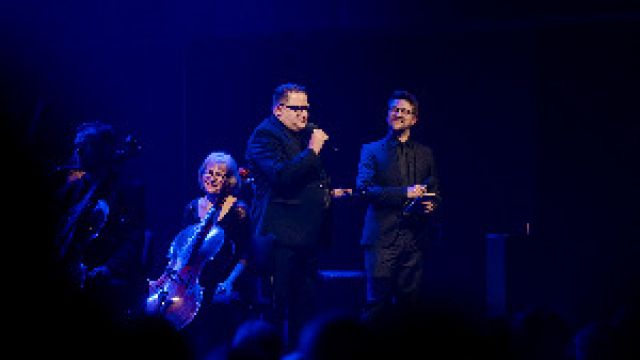Art of the Score - The Music of Hans Zimmer
Hans Zimmer has almost become a household name with his ongoing success as a media and film score composer, leading to live concerts, extending to a wide range of outlets such as documentaries, video games, even his own music production company; in fact, anything where the accent is on music technology. By experimenting with alternatives to the grand sound of a full symphony orchestra, he eventually succeeded in scoring the music for epic films such as Gladiator and Dune all of which could be played from a single computer rather than the regular orchestral sound stage.
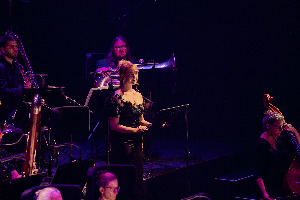
The QSO is branching out from the traditional by incorporating this kind of genre in their seasonal program: it is, after all, good box office whilst also providing the opportunity for audiences to view the industry at play with what is becoming the 'new' music. Zimmer's style is indeed grand, observing the amount of instrumentalists on stage including an impressive selection of percussive instruments and an over-blown (no pun intended) brass section; it therefore strikes one that the accent is on volume of sound rather than quality of orchestration contributing to his reputation as being more of a, to quote Christopher Nolan, 'minimalist composer with a sort of maximalist production sense'. And this was evident in this concert with experienced conductor Vanessa Scammell having more than her hands full with the selection of thirteen excerpts from most of Zimmer's successful scores.
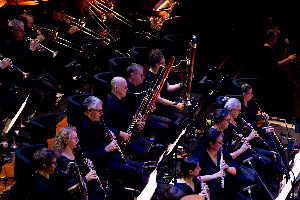
Included with the concert were a series of introductions to the program by producer, director and musician Andrew Pogson and Associate Professor Dan Golding, a well-known and respected figure in the world of tertiary media and radio. With an almost full-house at their feet, the duo were most informative and entertaining providing comic relief, even audience participation, in direct contrast to the performance of some of Zimmer's darker scores. There was, for example, a fascinating play on the musical sources of Pirates of the Caribbean with some fun orchestral arrangements of sailors hornpipes, all providing a little insight into the composer's compositional techniques. In the second part there was also reference to the minimalist approach to the scoring of Batman, in contrast to a previous score to the franchise by Danny Elfman, an excerpt of which was played in the concert and, may I say, far more to my liking.
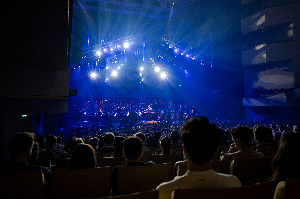 This leads me on to comment that despite Zimmer's success, this particular concert emphasized the fact that a majority of the concert really needed the visuals as accompaniment and lacked the intricate content and colourful orchestration found with so many other famous film composers, James Newton Howard, John Williams and so on, the list goes on. It demonstrated the lack of a 'warm' human touch, more subtlety as opposed to the ever-increasing somewhat foreboding take-over of technology. I have also attended a Hans Zimmer in-person live concert, which included a minimal list of musicians: it was just as effective in presentation, though no doubt there was maximum technology being used behind the scenes. Perhaps this is the reason why some of the more well-known works presented in this concert didn't work for me as well, particularly Chevaliers de Sangreal from The Da Vinci Code, one of my favourites, along with the Suites created from Batman, Interstellar and Gladiator all being too repetitive and not really suitable concert works as such. The final work on the program, however, also from Gladiator and additionally one of my favourites, with guest mezzo-soprano Cassandra Seidemann, was a welcome relief with the vocals being beautifully executed whilst bringing the concert to a satisfying close.
This leads me on to comment that despite Zimmer's success, this particular concert emphasized the fact that a majority of the concert really needed the visuals as accompaniment and lacked the intricate content and colourful orchestration found with so many other famous film composers, James Newton Howard, John Williams and so on, the list goes on. It demonstrated the lack of a 'warm' human touch, more subtlety as opposed to the ever-increasing somewhat foreboding take-over of technology. I have also attended a Hans Zimmer in-person live concert, which included a minimal list of musicians: it was just as effective in presentation, though no doubt there was maximum technology being used behind the scenes. Perhaps this is the reason why some of the more well-known works presented in this concert didn't work for me as well, particularly Chevaliers de Sangreal from The Da Vinci Code, one of my favourites, along with the Suites created from Batman, Interstellar and Gladiator all being too repetitive and not really suitable concert works as such. The final work on the program, however, also from Gladiator and additionally one of my favourites, with guest mezzo-soprano Cassandra Seidemann, was a welcome relief with the vocals being beautifully executed whilst bringing the concert to a satisfying close.
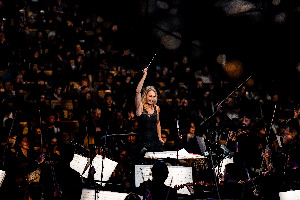 One shouldn't always knock success because Hans Zimmer's artistry continues to reflect an extremely passionate, hard-working, gifted and prolific exponent of not only alternatives to the development of 'sound' as such, traditional music being just a portion of what we're surrounded by on a daily basis, but also his intrinsic abilities to enhance the visual experience. His success has also been measured by his contribution to movies that have generated millions of dollars worldwide and many may not know he has additionally been responsible for the successful careers of many other film composers. As a figure in the entertainment industry he is undoubtedly one to admire and congratulate.
One shouldn't always knock success because Hans Zimmer's artistry continues to reflect an extremely passionate, hard-working, gifted and prolific exponent of not only alternatives to the development of 'sound' as such, traditional music being just a portion of what we're surrounded by on a daily basis, but also his intrinsic abilities to enhance the visual experience. His success has also been measured by his contribution to movies that have generated millions of dollars worldwide and many may not know he has additionally been responsible for the successful careers of many other film composers. As a figure in the entertainment industry he is undoubtedly one to admire and congratulate.
With the colourful combination of personalities, a mega orchestral sound and a terrific lighting plot to reflect the various moods of the movie scenes, I'm sure the almost full-house would not have disappointed Hans Zimmer movie fans.
Brian Adamson
Subscribe to our E-Newsletter, buy our latest print edition or find a Performing Arts book at Book Nook.

